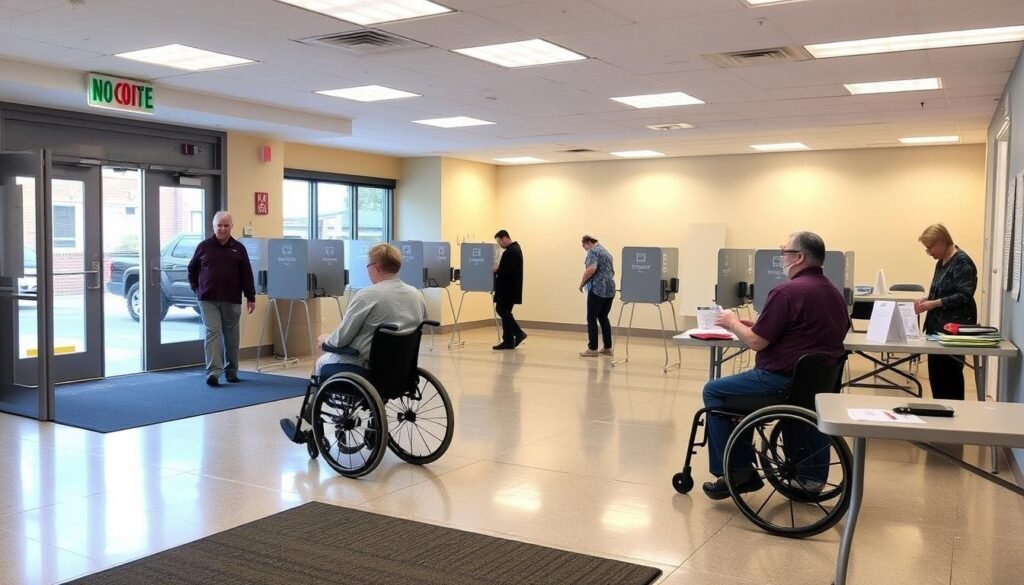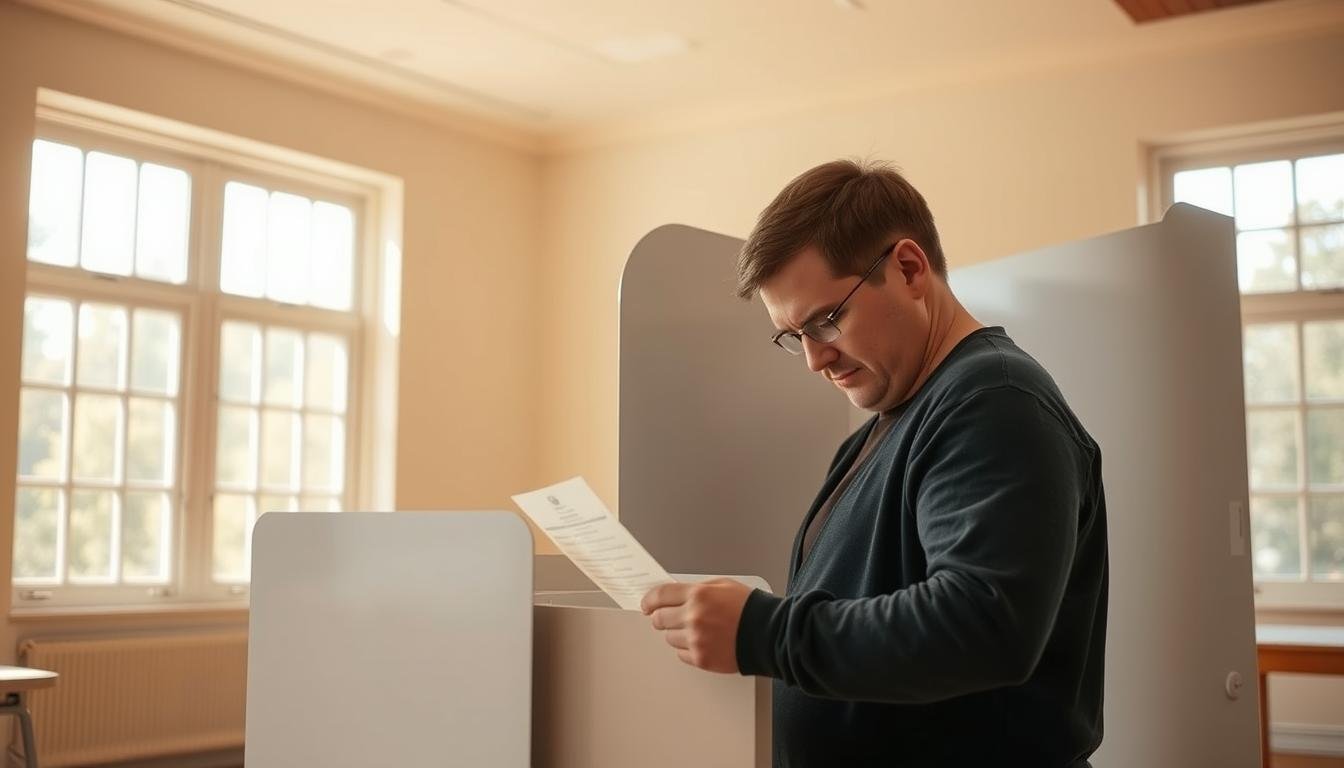Are People with Down Syndrome Allowed to Vote? Have you ever thought about if people with Down syndrome can vote? It’s a complex topic, with many laws involved.
In the U.S., disability voting laws are key. They decide if people with disabilities, like Down syndrome, can vote.
It’s important to know about these laws and their effects. This article will dive into the details of disability voting laws and what they mean.
Contents
- 1 Voting Rights for People with Down Syndrome
- 2 Can People with Down Syndrome Vote for President?
- 3 Understanding Guardianship and Voting Capacity
- 4 Accessibility and Accommodations at Polling Places
- 5 Preparing to Vote with Down Syndrome
- 6 Conclusion: Are People with Down Syndrome Allowed to Vote?
- 7 FAQ
- 7.1 What are the voting rights of people with Down syndrome?
- 7.2 How do federal and state laws impact the voting rights of individuals with Down syndrome?
- 7.3 Can people with Down syndrome vote for president?
- 7.4 How does guardianship affect the voting capacity of individuals with Down syndrome?
- 7.5 What accommodations are available to voters with disabilities, including those with Down syndrome?
- 7.6 How can individuals with Down syndrome prepare to vote?
- 7.7 What support systems are available to voters with Down syndrome?
- 7.8 Are polling places required to be accessible to voters with disabilities?
Voting Rights for People with Down Syndrome
The right to vote for people with Down syndrome is shaped by federal and state laws. It’s important to understand these laws to make sure everyone can vote. [Are People with Down Syndrome Allowed to Vote?]
Federal laws are key in protecting the voting rights of people with disabilities, like those with Down syndrome. The Americans with Disabilities Act (ADA) and the National Voter Registration Act (NVRA) are crucial. They help ensure that people with disabilities can vote.
Federal and State Laws
While federal laws set the basic rules, state laws can differ a lot. Some states have stricter rules or different ways for voters with disabilities to cast their ballots. For example, some states might have special rules for registering to vote or using technology at polling stations.
- Federal laws like the ADA and NVRA provide foundational protections for voters with disabilities.
- State laws can impose additional requirements or offer further protections.
- Understanding both federal and state laws is essential for navigating the voting process.
It’s also important to remember that laws and rules can change. Keeping up with updates to voting laws and procedures is vital. This ensures that people with Down syndrome and other disabilities can vote.
Can People with Down Syndrome Vote for President?
The right to vote in presidential elections is key to democracy. But can people with Down syndrome vote? In the United States, voting for president is a basic right. People with Down syndrome can vote if they meet the eligibility criteria.
Eligibility Criteria
To vote in a presidential election, you must meet certain rules. These rules change from state to state. You need to be a U.S. citizen, live in the state where you’re voting, and be at least 18 years old.
People with Down syndrome are not automatically barred from voting. Their voting rights are decided based on their mental capacity. This is judged by state laws.
In some states, people with Down syndrome might have guardianship. This can affect their voting rights. If someone is under guardianship, their voting rights might be limited or taken away. This depends on the guardianship terms and state laws.
| State | Voting Eligibility for People with Down Syndrome | Guardianship Impact on Voting Rights |
|---|---|---|
| California | Generally allowed if mentally competent | Guardianship may restrict voting rights |
| New York | Allowed unless deemed mentally incapacitated | Guardianship can revoke voting rights |
| Florida | Eligible if not under guardianship for mental incapacity | Guardianship for mental incapacity revokes voting rights |
It’s crucial for people with Down syndrome and their families to know their state’s voting laws. By understanding these laws, they can vote in presidential elections. This way, they can make their voices heard in democracy.
Understanding Guardianship and Voting Capacity
Guardianship and voting rights are closely linked, especially for those with Down syndrome. Guardianship means a court chooses someone to make decisions for another person. This is usually because the person can’t make their own choices.
Voting rights can be affected by guardianship. If someone with Down syndrome has a guardian, they might not be able to vote. This depends on the laws in their area and the guardian’s role.
To see if someone with Down syndrome can vote, we check if they understand voting. We look at if they can make choices based on what they know. This is key to knowing if they can vote.
- Understanding the nature and purpose of voting
- Recognizing the candidates and issues on the ballot
- Comprehending the voting process
Every person with Down syndrome is different. So, we must judge their voting ability individually. It’s also important to let them take part in voting decisions. We should help them by offering support and making voting easier for them.
By understanding guardianship and voting capacity, we can help people with Down syndrome vote. We aim to make sure they can vote as fully as they can.
See Also: Why Did FDR Serve 4 Terms as President?
Accessibility and Accommodations at Polling Places
If you have Down syndrome, you have the right to vote at a place that’s easy to get to. Making sure polling places are easy to reach is key for everyone to vote. [Are People with Down Syndrome Allowed to Vote?]
Polling places in the U.S. are getting better for people with disabilities. They’re adding ramps, elevators, and accessible bathrooms. This makes it easier for everyone to get in and vote.
When you go to vote, you’ll find help to make sure you can cast your ballot. You might see:
Available Accommodations for Voters with Disabilities
- Accessible voting machines with audio ballots or large print displays
- Sign language interpreters or assistive technology for voters who are deaf or hard of hearing
- Curbside voting for voters who have difficulty entering the polling place
- Trained poll workers who can assist voters with disabilities
The Help America Vote Act (HAVA) makes sure polling places have accessible voting systems. You can also call your local election office to find out what’s available at your polling place.

By making voting easier, we help everyone, including those with Down syndrome, to vote. If you have trouble at your polling place, tell your local election officials or the National Disability Rights Network.
Preparing to Vote with Down Syndrome
If you have Down syndrome and want to vote, there are steps to make it easier. It’s important to know how to vote and your rights. [Are People with Down Syndrome Allowed to Vote?]
First, you need to register to vote. The rules for this vary by state. You can find out what your state needs on their election website or by calling your local election office. Don’t forget to ask about any special help for voters with disabilities.
Having people you trust by your side can really help. This could be family, caregivers, or groups that support voters with disabilities. They can help you understand voting, sign up, and go to the polling place if you need it.
- Find local groups that help voters with disabilities.
- Call your local election office to learn about voting options for everyone.
- Try out voting equipment or materials before election day to feel more comfortable.
On election day, bring your voter card or ID to the polling place. If you need help, just ask the poll workers. They are ready to assist and make sure everyone can vote.
By getting ready early and having the right support, you can vote with confidence. Remember, your vote is key to democracy, and every voice counts.
Conclusion: Are People with Down Syndrome Allowed to Vote?
People with Down syndrome have the right to vote. It’s important to know how they can participate in elections. Their voting rights are protected, and there are ways to make sure their voices are heard.
Supporting voters with Down syndrome means making polling places and voting materials accessible. This helps them vote with confidence. It makes the voting process smoother for everyone.
The Down syndrome voting rights summary shows how crucial accessible voting is. We must keep promoting voter education and awareness. This ensures all citizens, including those with Down syndrome, can vote.
This conclusion on disability voting stresses the need for inclusive voting. By working together, we can make elections fair for everyone. This way, all voices are truly represented.
See Also: Exploring the Darker Side of Andrew Jackson’s Presidency
FAQ
What are the voting rights of people with Down syndrome?
People with Down syndrome can vote just like anyone else. They must meet their state’s rules, like being old enough and living there.
How do federal and state laws impact the voting rights of individuals with Down syndrome?
Laws like the ADA and Voting Rights Act help. They make sure people with Down syndrome can vote easily and fairly.
Can people with Down syndrome vote for president?
Yes, they can vote for president if they qualify. They need to be a U.S. citizen, 18 or older, and live in their state. [Are People with Down Syndrome Allowed to Vote?]
How does guardianship affect the voting capacity of individuals with Down syndrome?
Guardianship might change how someone with Down syndrome votes. A guardian could make voting choices for them. But, this depends on the state and the person’s situation.
What accommodations are available to voters with disabilities, including those with Down syndrome?
Polls must help voters with disabilities. They offer tools like audio ballots and large print. Poll workers can also help, so everyone can vote alone and in secret.
How can individuals with Down syndrome prepare to vote?
They can start by registering to vote. Learning about voting and getting help from disability groups are good steps too. [Are People with Down Syndrome Allowed to Vote?]
What support systems are available to voters with Down syndrome?
Groups like the National Down Syndrome Congress and the Arc of the United States offer help. They guide people with Down syndrome through the voting process.
Are polling places required to be accessible to voters with disabilities?
Yes, polls must be accessible under the ADA. This means they have ramps, parking for people with disabilities, and voting machines that are easy to use.

Hi, I am Tatum Bradford from Washington. I have a background in political science and work as a senior revenue officer. I love learning about U.S. presidents and sharing interesting facts about political history.

